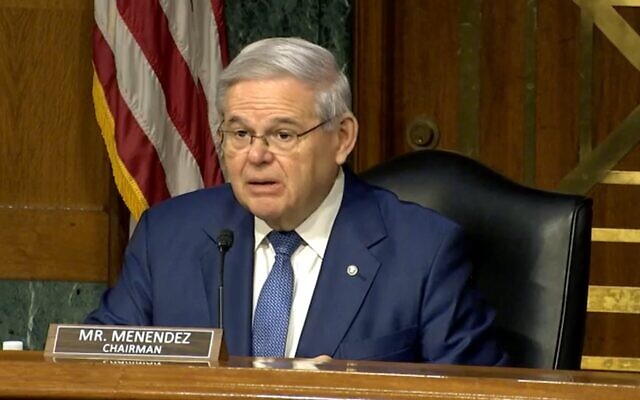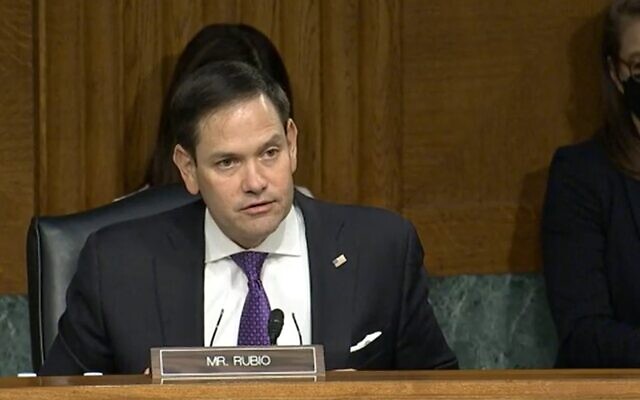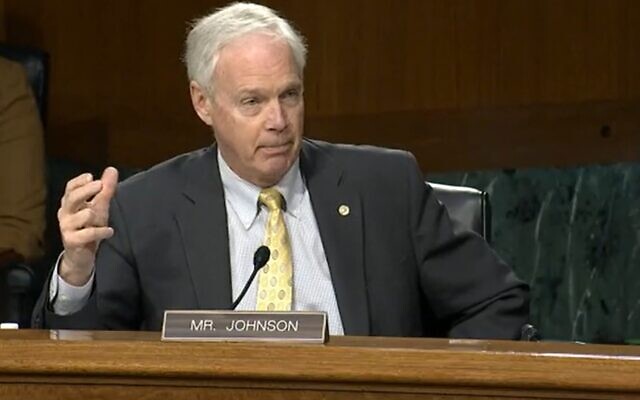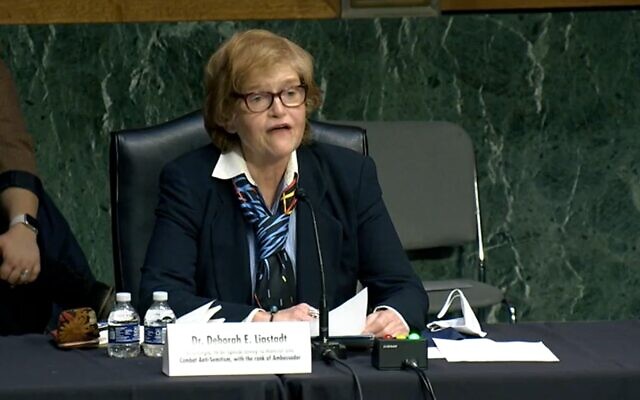Lipstadt Testifies at Confirmation Hearing
The lone voice of dissent came from a Republican who said that Lipstadt “engaged in malicious poison” on social media.
Dave Schechter is a veteran journalist whose career includes writing and producing reports from Israel and elsewhere in the Middle East.
After waiting 193 days for a confirmation hearing, Deborah Lipstadt began her testimony to the Senate Foreign Relations Committee on Tuesday with the Jewish prayer of thanks for captives being freed.
Lipstadt was referring to the outcome of last month’s hostage-taking at a synagogue in Colleyville, Texas, but might just as well have meant her nomination to be the U.S. Special Envoy to Monitor and Combat Antisemitism.
President Joe Biden nominated the Emory University professor on July 30, but Republicans delayed the hearing as a demonstration of their irritation about Lipstadt’s social media posts. That issue led to the hearing’s one testy exchange.
The committee chair, Democratic Sen. Bob Menendez of New Jersey, told Lipstadt that he was “truly disappointed it took this long to schedule your hearing.”

A confirmation hearing was required because the position now carries the rank of ambassador. If approved by the committee — a vote has yet to be scheduled — and then the full Senate, Lipstadt’s portfolio at the State Department would include anti-Semitism anywhere in the world, except, by law, in the United States.
Jewish groups renewed their push for Lipstadt’s confirmation following the Jan. 15 hostage-taking at Congregation Beth Israel, which ended with four hostages physically unharmed and their assailant killed by the Federal Bureau of Investigation.
“Senators, this was no isolated incident. Increasingly Jews have be singled out for slander, violence and terrorism. Today’s rise in antisemitism is staggering. We witness this surge less than eight decades after one out of every three Jews on earth was murdered,” Lipstadt said in her opening statement. “Often in their long history, Jews have felt abandoned, but then is not now, certainly not in the United States. Today, the American government recognizes Jew-hatred as a serious global challenge.”
“Jew-hatred can be found across the entire political spectrum. One finds it among Christians, Muslims, atheists and sadly, even a handful of Jews. One finds it in Europe, the Middle East, Latin America and even in countries with no Jews. I am an equal-opportunity foe of antisemitism. Unless one is willing to fight Jew-hatred wherever one finds it, one should not be a nominee for this position,” she said.
If confirmed, the 74-year-old Lipstadt would take a leave of absence from Emory, where she is the Dorot Professor of Modern Jewish History and Holocaust Studies in Emory’s Tam Institute for Jewish Studies and the religion department.

Florida Republican Sen. Marco Rubio asked Lipstadt about the Amnesty International report issued Feb. 1 and titled “Israel’s apartheid against Palestinians: a cruel system of domination and a crime against humanity.”
Lipstadt said, “I found the language used in that report … more than ahistorical. I found it unhistorical. Branding Israel an apartheid state is more than historically inaccurate. I believe it’s part of a larger effort to delegitimize the Jewish state. Such language, I see it spilling over onto campuses, where it poisons the atmosphere, particularly for Jewish students.”
Rubio gave Lipstadt the opportunity to discuss the controversy over her social media posts, notably one concerning Wisconsin Republican Ron Johnson, a member of the committee.
On March 14, 2021, Lipstadt posted an article about a statement made by Johnson, that he would have been more concerned about the Jan. 6, 2021, attack on the Capitol if the mob had been made up of “Black Lives Matter and antifa protesters” rather than supporters of then-Present Donald Trump. Lipstadt’s comment said of Johnson’s statement, “This is white supremacy/nationalism. Pure and simple.”
Lipstadt told Rubio that “sometimes I have not been as nuanced in my tweets as I like” and that she has “been exceptionally critical of members of the Democratic Party, of people on the end of the spectrum, political spectrum, where I place myself.”
Lipstadt’s clarification that her criticism pertained to behavior, not the person, did not satisfy Johnson, who referenced the Biblical commandment not to bear false witness. “But that’s not true. What you just testified there is false,” Johnson told her. “You have engaged in the malicious poison [of social media] … You’ve never talked to me. You’ve never met me. You don’t know what’s in my heart.”

Johnson said that he would accept Lipstadt’s apology, “But I think that somebody who has had a 30-year professional career ought to know better. … I certainly cannot support your nomination. … You’re just simply not qualified for it.” After his response to Lipstadt, Johnson left the committee chamber.
No other senator attending the hearing voiced opposition to her nomination.
Ohio Republican Rob Portman asked Lipstadt about programs to improve security at Jewish institutions in the United States. “The division between domestic and international antisemitism is getting murkier,” Lipstadt said, noting that the hostage taker in Texas “was radicalized abroad and then came here to do his handiwork.” She added that security concerns extend to Congregation Ohr HaTorah, the synagogue she attends in Atlanta.
Under questioning from Maryland Democrat Chris Van Hollen, Lipstadt said that while all criticism of Israeli policies is not anti-Semitic, “certain things cross the line into antisemitism and criticism can cross the line.”
Before the hearing adjourned, Lipstadt assured Menendez that she understood the difference between making comments as a private citizen and as a public servant, and that she “already had begun an education with would-be colleagues at the State Department.”
- Ohio Republican Rob Portman
- Deborah Lipstadt
- Senate Foreign Relations Committee
- U.S. special envoy to monitor and combat anti-Semitism
- President Joe Biden
- Emory University
- Sen. Bob Menendez
- Congregation Beth Israel
- Federal Bureau of Investigation
- Antisemitism
- Jew-hatred
- Dorot Professor of Modern Jewish History and Holocaust Studies
- Christians
- Muslims
- Atheists
- Emory’s Tam Institute for Jewish Studies
- Sen. Marco Rubio
- Wisconsin Republican Ron Johnson
- Chris Van Hollen




comments